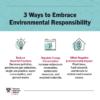What is ESG – a guide for businesses
ESG – short for Environmental, Social and Governance – is a set of standards measuring a business’s impact on society, the environment, and how transparent and accountable it is.
Acccording to the CBI, two-thirds of investorsLink opens in a new window take ESG factors into account when investing in a company meaning ESG has the potential to grow your business while benefiting the environment and community.
An ESG strategy can demonstrate that the company is reducing risks such as adapting manufacturing processes to meet future environmental legislation which could make the business a good bet for longer-term growth.
With ESG as an important component for business growth it can pay to understand what ESG is, where your business can adopt its principles and approaches, and how it can benefit your organisation.
What is ESG?
With ESG as an important component for business growth it can pay to understand what ESG is, where your business can adopt its principles and approaches, and how it can benefit your organisation.
ESG is a collective term for a business’s impact on the environment and society as well as how robust and transparent its governance is in terms of company leadership, executive pay, audits, internal controls, and shareholder rights.
It measures how your business integrates environmental, social, and governance practices into operations, as well as your business model, its impact, and its sustainability.
The three components that make up ESG are environmental, social and governance.
Environment
The environmental aspect focuses on how the business minimises its impact on the environment.
It covers the business’s products/services, the supply chain and operations.
ESG allows the business to target different areas of its organisation and implement more sustainable, ethical practices.
Examples of environmental business practices include:
- reducing energy and using renewable energy sources to become a net zero organisation
- developing greener products and services
- switching to zero-waste products or sustainable packaging using biodegradable materials
- reducing carbon emissions by changing to LED lighting
- encouraging recycling and reducing the amount of waste destined for landfill.
Sustainability is based on the principle that everything we need for survival depends directly or indirectly on the natural ecosystem. Sustainability is the management and protection of the Earth and its natural resources to support present and future generations. It is a balance of society, economy, and environment in a holistic way. Sustainability is often thought of as a long-term goal while sustainable development refers to the many processes and pathways to achieve this.
Social
The social aspect focuses on how a business impacts wider society and workplace culture.
Organisations can positively contribute to fairness in society, investing in fair and equal opportunities and conditions for employees, people working in the supply chain, and local communities.
Equality and fairness are at the heart of this aspect and examples of social and ethical business practices include:
- ensuring products are safe and customer data is secure
- preventing abuses within the supply chain, such as labour rights, including modern slavery and freedom of association
- providing training and supporting health and safety, and wellbeing
- promoting equality in the workforce with diversity and inclusivity policies
- investing in local community projects, such as funding educational initiatives.
Corporate Social Responsibility (CSR) is a concept where businesses integrate social and environmental concerns into their operations and interactions with stakeholders. CSR is generally understood as being the way a company achieves a balance of economic, environmental, and social imperatives (Triple-Bottom-Line) while at the same time addressing the expectations of shareholders and stakeholders.
Governance
Governance refers to the processes of decision-making, reporting, and the logistics of running a business.
It also looks at the business’s ethical behaviour and its transparency with stakeholders about its activities.
Governance is linked to the environmental and social aspects of ESG in that it looks at the transparency and decision-making behind them.
Examples of governance practices include:
- accurate reporting to stakeholders on financial performance, business strategy and operations
- ensuring business leaders and managers are accountable for risk and performance management
- undertaking business ethically, such as preventing bribery
- ensuring diversity in any leadership team and being open about executive pay.
Ensuring good governance in your business can appeal to investors and your supply chain and practising good governance may also help enable businesses to grow.


